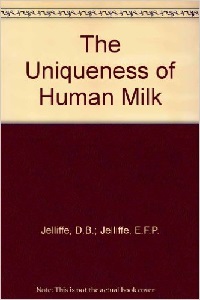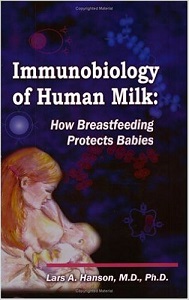
|
|||||
|---|---|---|---|---|---|

|
|||||
Popular Articles: |
by Arlene F. Jacobs, reprinted with permission
|
|
This is a hard topic for me, but I really feel that it needs to be addressed. Breast-feeding does provide immunity, for as long as children are breast-fed. Breast-feeding's immunological benefits don't suddenly stop at a certain age.
First from my nutritional
background. Breast-milk contains white blood cells and antibodies (IgA, IgM and a little IgG). Along with these is an iron-grabbing protein, lactoferrin, which binds iron, keeping bacteria from getting the iron they need to grow on. Both white blood cells and lactoferrin have been shown to greatly reduce or curtail bacterial growth in freshly expressed breast-milk. If the milk is frozen then this activity is greatly diminished or eliminated depending on the freezer temperature and length of time frozen.
Colostrum contains a greater concentration of antibodies than the milk that follows it, however, the breast-milk also contains these agents which have been shown to protect the infant against life-threatening intestinal disorders. Antibodies inactivate dangerous bacteria in the infant's digestive tract where they would cause great harm, while promoting the growth of the digestive-friendly
bacteria, such as Lactobacillus.

The Uniqueness of Human Milk |
Infants under the age of 4 to 6 months have an open gut
. This term refers to the interstitial space between the cells of the small intestine. In infants this allows the passage of intact proteins directly from their gut into their blood stream. It has been shown that the antibodies in breast-milk will pass directly into the blood stream of infants - thus giving the infant passive immunities. These may be antibodies that are generated by the mother when the mother is exposed to some illness. These antibodies are therefore very specific in defending the infant against germs that the mother, and probably the infant, have been exposed to.
Likewise, large proteins from other foods
can pass into the blood stream of infants. This is one reason that if an infant is exposed to a food that may cause allergic reactions, this is the time that it will occur with the most devastating results, and usually life-long allergy. Milk proteins from cow's milk are often found whole in the blood stream of infants fed cow milk-based formulas or whole cow's milk, and are more likely to develop allergies to them.

Immunobiology of Human Milk |
After 6 months, the gut closes
and large proteins do not pass intact into the blood stream. This eliminates the passive immunity. However, there is still the benefit of decreased ear infections.
Infants that are breast-fed are less likely to get ear infections. One of the reasons being that when the milk pools in the ear canal (and this happens in all infants due to the shape of the Eustachian tubes) with breast-milk, there is less bacterial growth.
My first son, Kevin, was born without an immune system. He was exclusively breast-fed for the first 4 1/2 months of his life and healthy as anything. With the introduction of solids he broke out in hives
. With the removal of solids, and return to full breast-feeding his skin cleared up - until 6 months of age, when he began to get one cold after another, ear infections, pneumonia. His skin became a nightmare of eczema sores. He was miserable. Food totally disagreed with his system. He was then diagnosed with Severe Combined Immune Deficiency (or bubble boy disease).
He was given a bone marrow transplant at 9 months, however he became ill and the bone marrow rejected
him. He died following complications resultant from that at 18 months.
My breast-milk kept him healthy for the first 6 months of his life. My breast-milk kept him alive for 18 months, almost exclusively.
Arlene E. Jacobs, M.S. is a nutritional biochemist, writer, and stay-at-home mother of two, in Alabama.
This article first appeared in The Compleat Mother magazine in the Summer'97 issue.
This article compliments of Born to Love.
Send questions, comments, and suggestions to: catherine@borntolove.com
Born to Love articles are written by Catherine McDiarmid-Watt
Born to Love is a participant in the Amazon Services LLC Associates Program, an affiliate advertising program designed to provide a means for sites to earn advertising fees.
NOTE: All logos, company names, brands, images, trademarks and other intellectual property are the property of their respective owners.
Born to Love is a participant in the eBay Partner Network, an affiliate advertising program designed to provide a means for sites to earn advertising fees by advertising and linking to eBay.com.
Copyright © 1978 - BorntoLove.com - All Rights Reserved.
Last updated - April 5, 2024